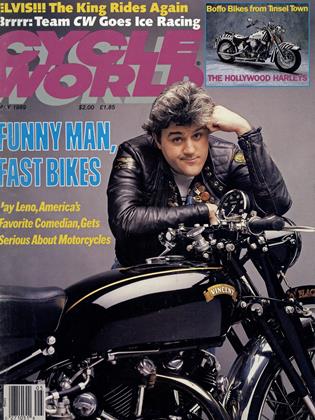ROKO LEVER SKINS
CW EVALUATION
The Great Cover-up
AT SOME POINT A LONG TIME AGO, somebody discovered that rubber grips on motorcycle handlebars were a good idea. It couldn't have been a very difficult thing to figure out— blisters have a way of fostering inventiveness. And bare metal has a way of fostering blisters.
But it’s taken a lot longer for someone to figure out that the front brake and clutch levers of motorcycles have a need for rubber grips as well. After all, they're the only points at which bare metal actually comes in contact with any part of the rider's body —even gloves can be pretty flimsy protection. The people at Roko Sports thought about the problem and came up with Lever Skins, rubber covers that fit tightly over levers.
The most novel thing about Lever Skins is how they’re installed. When you first pull the product out of the sealed foil package that it comes in, it looks like a soft, oversized section of rubber fuel hose. Each section of hose is lubricated and slides easily over the lever, but at that point the Skin is loose and poorly fitting. Overnight exposure to air activates a shrinking process, and after about 12 hours the Skin has formed itself perfectly to the contour of the lever.
How do Lever Skins work? At first, you can barely tell any difference between normal levers and those covered with the Skins, whether they are on a street bike or a dirt bike. In offroad riding, though, they make a big difference when the going gets wet and muddy. The little bit of extra grip that the Skins provide makes operating the levers that much easier.
On the street, the difference is much more subtle. Even though the product was originally designed and tested off-road, the majority of early sales have been for street bikes, according to Roko. In that environment, about the only noticeable difference is that they make the hard edges of the lever a little more comfortable. If you're in the somewhat questionable habit of riding without gloves, the Lever Skins’ added comfort is more noticeable: They make the bike a little more pleasant to the touch. One slight downfall is that the covering tends to be a little short to fully ensconce some street levers.
But on or off the road, it’s difficult to say if the Lever Skins will prevent blisters. Most veteran motorcycle riders already have their own protection-calluses. But common sense will tell you that a soft, rubber surface is going to be a little easier on your hands than hard aluminum. And Lever Skins are a much better solution than the age-old practice of wrapping levers with friction tape.
Suggested retail for a set is $6.95, and they’re available at most motorcycle shops. If you can't find them, contact Roko Sports, P.O. Box 2760, Camarillo, CA 93011; (805) 2529806. H











